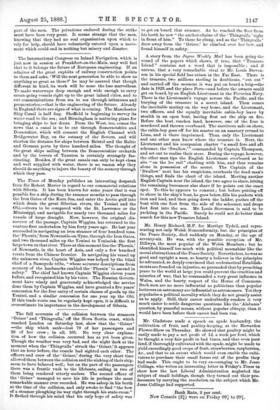• The International Congress on Inland Navigation, which is just
now in session at Frankfort-on-the-Main, may well feel that to it belongs the future of European engineering. If an admirer of the great exploits of railway construction points to them and asks, ' Will the next generation be able to show us anything as great as these P' he may be assured that though different in kind, its work will be none the leas marvellous. To make waterways deep enough and wide enough to carry ocean-going vessels right up to the great inland cities, and to out communications from sea to sea through isthmuses and promontories,—that is the engineering of the future. Already in England there are signs of what is coming. The Manchester Ship Canal is half dug. Sheffield is beginning to survey its water-road to the sea; and Birmingham is maturing plans for _ bringing ships to her doors. From the West, too, comes the news that a canal is to be cut through Somersetshire and Dorsetshire, which will connect the English Channel with Bridgewater Bay, on the estuary of the Severn, and will shorten the distance for ships between Bristol and the Baltic and German ports by three hundred miles. The thought of the great ships sailing between the Somersetshire orchards and by the towers of Taunton is certainly strangely fas- cinating. Besides, if the great canals can only be kept clean and well supplied with water, there is no reason why they should do anything to injure the beauty of the scenery through which they pass.


































 Previous page
Previous page